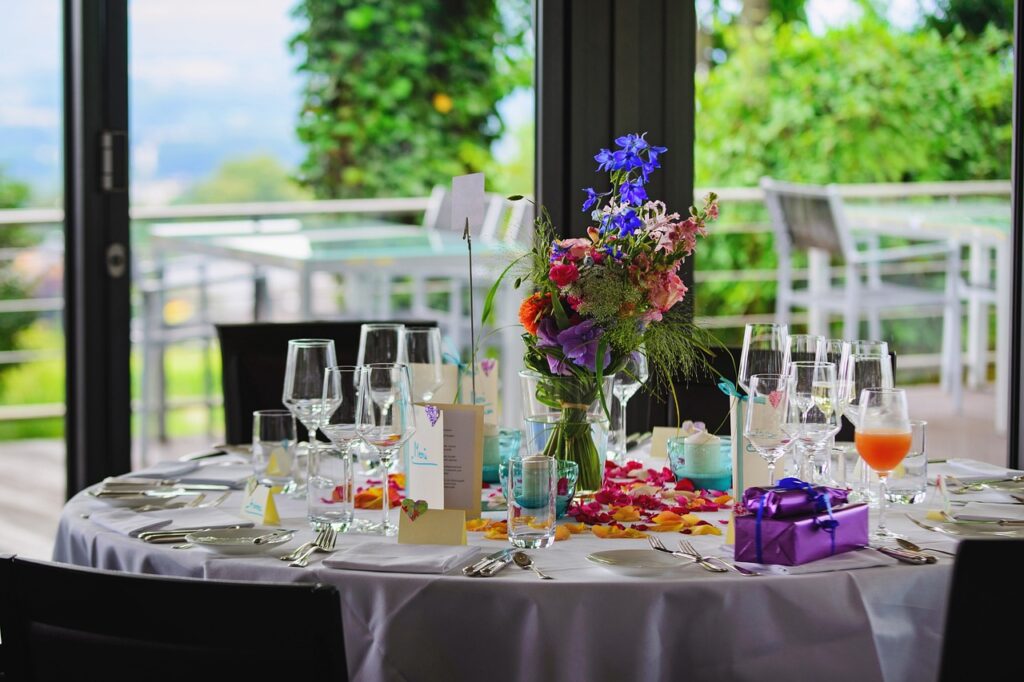Event planning is a dynamic and rewarding career, with professionals orchestrating a diverse range of events, from corporate meetings to weddings. As an event planner, you play a vital role in bringing people together and creating memorable experiences. The demand for skilled event planners is on the rise, with the industry expected to grow by 8% through 2032. This blog offers a comprehensive guide to help you embark on a successful event planning career and make the most of the opportunities available in this thriving field.
Types of Event Planners
There are different types of event planners, specializing in specific types of events or services. Here are some of the common types of event planners:
- Corporate Event Planner: These planners focus on organizing events for businesses and organizations, such as conferences, seminars, product launches, team-building activities, and corporate parties.
- Wedding Planner: Wedding planners specialize in organizing weddings and related events, such as engagement parties, bridal showers, and rehearsal dinners. They help couples plan and execute their dream weddings.
- Social Event Planner: Social event planners work on a wide range of personal celebrations, including birthday parties, anniversaries, bar and bat mitzvahs, and other social gatherings.
- Nonprofit Event Planner: Nonprofit event planners are typically employed by or work closely with nonprofit organizations to organize fundraising events, charity galas, and awareness campaigns.
- Trade Show/Exhibition Planner: These planners focus on arranging trade shows and exhibitions, coordinating booth setups, managing logistics, and ensuring exhibitors and attendees have a successful experience.
- Meeting Planner: Meeting planners specialize in organizing small to large-scale business meetings, including board meetings, conventions, and seminars.
- Sports Event Planner: Sports event planners manage sporting events, ranging from local tournaments to major international competitions. They handle logistics, venue selection, and scheduling.
- Concert and Entertainment Planner: These planners work in the music and entertainment industry, organizing concerts, music festivals, and other entertainment events.
- Destination Event Planner: Destination event planners specialize in organizing events in specific locations or destinations, including destination weddings, corporate retreats, and incentive trips.
- Party Planner: Party planners focus on private and social events, including children’s parties, themed parties, and other intimate gatherings.
- Exhibition and Trade Show Planner: These planners coordinate exhibitions and trade shows, ensuring that exhibitors and attendees have a positive experience.
- Festival and Fair Planner: Festival and fair planners organize public events like music festivals, food festivals, cultural fairs, and art exhibitions.
- Government Event Planner: Government event planners work for government agencies and organizations to plan events like conferences, public hearings, and community outreach programs.
- Academic Event Planner: Academic event planners arrange events related to educational institutions, including conferences, seminars, and graduation ceremonies.
- Health and Wellness Event Planner: These planners focus on organizing events related to health and wellness, such as wellness retreats, health fairs, and fitness expos.
- Cultural Event Planner: Cultural event planners coordinate events that celebrate and promote cultural diversity, including cultural festivals, art exhibitions, and heritage events.
- Environmental Event Planner: Environmental event planners organize events with a focus on sustainability and environmental awareness, including eco-friendly conferences and green expos.
Event planners may also choose to specialize in niche areas within these broader categories. Their responsibilities can vary widely, but they all share the common goal of ensuring the success and smooth execution of the events they plan.

Education and Certification in Event Planning
Acquiring a solid educational foundation is crucial for a successful career in event planning. Pursuing a degree or diploma in a relevant field equips you with the necessary skills and knowledge to excel in this industry.
Bachelor’s and Associate degrees in Event Management or Hospitality Management provide comprehensive training in various aspects of event planning.
Beyond formal education, numerous certifications can set you apart in the competitive job market. Some popular event planning certifications include:
- Certified Meetings Professional (CMP)
- The CMP certification, recognized globally, demonstrates expertise in event planning and sets you apart from your peers.
- Certified Special Events Professional (CSEP)
- The CSEP certification focuses on the special events industry, covering topics such as event design, logistics, and marketing.
- Certified Professional in Catering and Events (CPCE)
- This certification is designed for individuals working in the catering and events industry, particularly those in leadership or managerial roles, such as event planners, caterers, and event venue managers.
- Certified Government Meeting Professional (CGMP)
- For event planners working in the government sector, the CGMP certification can be a valuable asset.
- Global Travel Professional (GTP)
- The GTP certification is designed for travel professionals who work in various roles related to corporate and business travel management, including travel managers, travel buyers, and other industry experts.
- Digital Event Strategist (DES)
- The DES certification is designed for event professionals who specialize in planning, organizing, and managing digital and hybrid events.
Obtaining certifications demonstrates your commitment to the industry and mastery of essential event planning skills. These credentials can significantly enhance your career prospects and showcase your expertise to potential clients.
Developing Skills and Gaining Experience in Event Planning
As an aspiring event planner, honing specific skills is vital to your success. Essential competencies include strong organizational and communication skills, creative problem-solving abilities, and time management and multitasking capabilities. Additionally, the ability to adapt and handle unexpected situations is crucial in this fast-paced industry.
Staying updated on industry trends and technologies is another critical aspect of a successful event planning career. By keeping abreast of the latest innovations, you can provide cutting-edge solutions to your clients and maintain a competitive edge in the market.
To gain practical experience and build a diverse portfolio, consider internships and entry-level positions in various sectors, such as non-profits, arts, healthcare, and MEEC and SMERF markets. These opportunities allow you to develop your skills and showcase your expertise to potential employers.
Building a solid foundation of experience in event planning is crucial for aspiring professionals.
Internships and Volunteering
Starting with internships or volunteering opportunities allows you to gain hands-on experience while building a network of contacts in the industry. These opportunities can often lead to valuable insights, mentorship, and potential job offers.
Small to Larger-Scale Events
Progressing from small to larger-scale events helps develop the necessary skills for managing complex and high-stakes projects. Begin by organizing smaller events, such as fundraisers or community gatherings, and gradually work your way up to larger, more elaborate affairs.
Entry-Level Positions
Securing entry-level positions in event planning companies or related industries can provide a wealth of learning opportunities and exposure to various aspects of the field. These positions can also serve as stepping stones to more advanced roles within the industry.

Networking and Building Professional Relationships in Event Planning
Networking plays a significant role in the event planning industry, as it can lead to new opportunities, collaboration, and invaluable insights. Attending networking events and conferences allows you to connect with fellow professionals and potential clients, expanding your reach in the market.
Online networking is equally important, with social media and industry forums providing platforms to engage with experts and learn from their experiences. By building a strong online presence, you can showcase your expertise and develop meaningful connections with people in the event planning community.
Engaging with industry professionals and learning from their experiences not only enhances your skills but also helps you stay updated on the latest trends and best practices in the field. Embrace networking as a continuous process, and invest time in building lasting professional relationships to achieve long-term success in your event planning career.
Creating an Event Planning Portfolio
An event planning portfolio is essential to showcase your skills, experience, and unique offerings to potential clients. A comprehensive portfolio should include staged event photos, a tailored online presence, and engaging blog posts detailing your event planning experiences and insights. Additionally, gathering testimonials from satisfied clients and colleagues can add credibility to your work.
Utilize free resources to enhance your portfolio’s visual appeal and functionality. Tools like Canva, Social Tables, Grammarly, Appointlet, WordPress, and Wedding Spot can help you create captivating visuals, streamline your planning process, and maintain a professional online presence. By investing time and effort in creating a compelling event planning portfolio, you can effectively demonstrate your expertise and attract the right clients for your business.
Specializing in a Specific Type of Event Planning
Exploring various event planning niches allows you to identify the specific area that resonates with your interests and expertise. Specializing in a particular event type can help you stand out in the market and attract clients looking for a tailored approach to their events.
Some popular event planning specializations include corporate events, weddings and social events, non-profit and fundraising events, government and political events, and conferences and trade shows. By focusing on a specific niche, you can develop in-depth knowledge and skills that set you apart from the competition, ultimately leading to a more fulfilling and successful career in event planning.

Marketing Yourself and Your Services in Event Planning
Personal branding is crucial in the event planning industry, as it helps you stand out and effectively communicate your unique offerings to potential clients. Developing a unique selling proposition sets you apart from the competition and highlights the specific value you bring to your clients’ events.
Utilize digital marketing strategies, such as social media marketing, content marketing, and email marketing, to reach a wider audience and showcase your expertise. These platforms allow you to engage with potential clients, share your successes, and stay connected with industry trends.
Building a strong reputation is essential for long-term success in event planning. Focus on providing excellent customer service and delivering successful events to create a positive impression that will lead to referrals and repeat business.
Continuous Improvement and Professional Development in Event Planning
Lifelong learning is essential in the event planning industry to stay ahead of the competition and continually grow your skills. Staying updated on the latest event planning trends and technologies ensures you remain relevant and can provide innovative solutions to your clients.
Participating in professional development opportunities, such as workshops, webinars, and conferences, can help you refine your skills, expand your network, and discover new ideas. These experiences contribute to your growth as an event planner and enhance your ability to deliver exceptional events.
Seeking unbiased advice from education and career experts, like those at Pathways to Advancement, can provide valuable insights for your professional development. By staying committed to continuous improvement, you can achieve long-term success and satisfaction in your event planning career.
Take Your Event Planning Career to New Heights
Becoming a successful event planner involves acquiring relevant education and certifications, developing essential skills and competencies, networking and building professional relationships, creating a comprehensive portfolio, specializing in a specific event type, marketing yourself and your services, and continually striving for improvement and professional development.
We encourage you to pursue a rewarding and fulfilling career in event planning and invite you to explore the educational programs and resources available through Pathways to Advancement. Kickstart your event planning career today with guidance and support from Pathways to Advancement!



